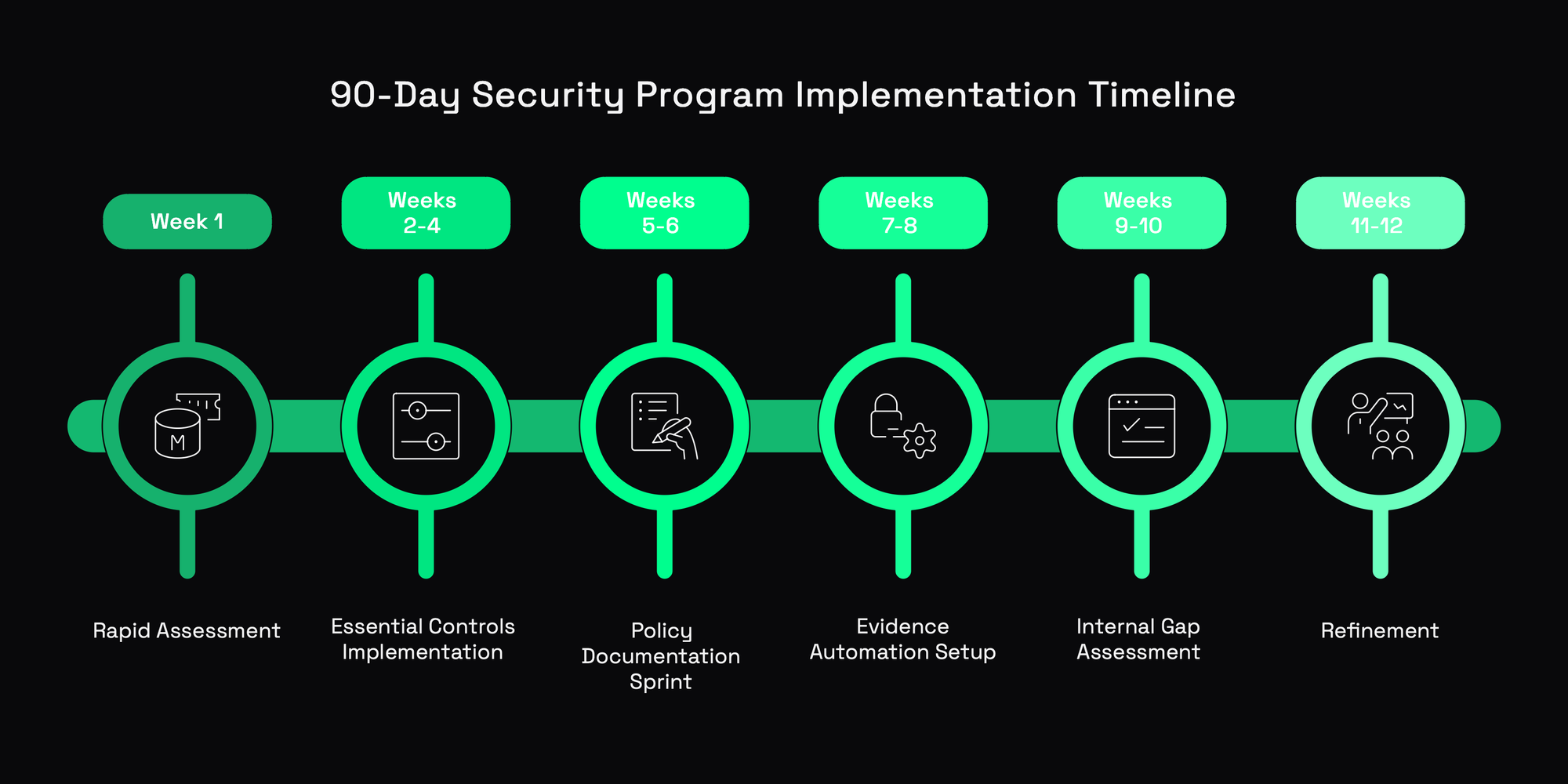How Founders and CTOs Can Build a Security Program in 90 Days (Without Losing Their Mind)

Nikoloz Kokhreidze
Build an ISO 27001 and SOC 2-aligned security program in 90 days to win enterprise deals. Practical guide for founders and CTOs with limited time.

I've spent 13 years building security programs for Forbes Cloud 100 FinTech, banking, and FMCG companies, so let me be honest with you.
Most founders and CTOs approach building security programs the wrong way. Usually, they are either:
- Trying to become security experts themselves (impossible while running a company)
- Hiring Big 4 consultants who optimize for billable hours, not business outcomes
- Procrastinating until an enterprise deal forces their hand (then panicking)
What most people don’t say is that you don’t have to become a security expert to build a security program. You should focus on your product and business, while someone with experience builds the security foundation that helps you win enterprise deals.
In this guide, I will show you how to build a security program aligned with ISO 27001 and SOC 2 in 90 days. You can do it yourself if you have the time and skills, or work with a fractional CISO if you want to stay focused on growing your business.
Want to build an enterprise-grade security program?
Let me show you how working with a fractional CISO can unlock your business through pragmatic security leadership.
The Real Problem: Founders and CTOs Drowning in Security

Here is what happens all the time:
Month 1: The enterprise prospect sends a 200-question security questionnaire. CTO spends 3 days answering it (poorly). Deal stalls.
Month 2: Board asks about security posture for Series B. Founder spends 2 weeks researching ISO 27001 requirements. Feels overwhelmed. Nothing gets implemented.
Month 3: Another enterprise deal blocked. CTO realizes they need "someone" to handle security. Starts 6-month search for full-time CISO. Meanwhile, deals keep dying.
Month 6: Still no CISO hire. €5-10M in enterprise pipeline blocked. Competitors with working security programs win the deals.
Sound familiar?
The hard truth is that building a security program takes a full-time effort for 90 days. As a founder or CTO, you likely don’t have that kind of time. You need to build your product, lead your team, and grow your business.
What "Security Program" Actually Means
Let’s be clear about what we’re building. A security program is not:
- ❌ A pile of security tools
- ❌ A checkbox compliance exercise
- ❌ Perfect, enterprise-grade security architecture
- ❌ A guarantee you'll never be breached
A security program IS:
- ✅ Documented policies and procedures that show you take security seriously
- ✅ Essential technical controls that actually reduce risk
- ✅ Evidence collection systems that prove you do what you claim
- ✅ Incident response capability when (not if) something goes wrong
- ✅ Clear answers to enterprise security questionnaires
This approach is what helps you win enterprise deals. It’s not about being perfect, but about showing real progress and maturity.
The 90-Day Security Program Framework

Whether you do this yourself or work with a fractional CISO, here’s the plan:
Month 1: Foundation (Weeks 1-4)
Week 1: Rapid Assessment
- Catalog what security measures already exist
- Identify gaps that block enterprise deals
- Prioritize based on actual customer questionnaires you've received
- Define "done" criteria aligned to ISO 27001 and SOC 2
Time investment if DIY: 40-60 hours (mostly your time)
Time investment with Fractional CISO: 4-6 hours (your strategic input only)
Weeks 2-4: Essential Controls ImplementationThe 34 controls that enterprise buyers actually care about:
- Information security policy
- Asset inventory
- Access control & authentication
- Change management process
- Backup procedures (tested, not theoretical)
- Incident response plan
- Risk assessment framework
- Vendor/third-party risk management
- Security awareness training
- Audit logging & monitoring
You don’t need all 114 controls or a perfect setup. Focus on the essential controls that answer most enterprise security questions.
Time investment if DIY: 120-160 hours (CTO + engineering team)
Time investment with Fractional CISO: 15-20 hours (review and decisions only)
Want to build an enterprise-grade security program?
Let me show you how working with a fractional CISO can unlock your business through pragmatic security leadership.
Month 2: Documentation and Automation (Weeks 5-8)
Weeks 5-6: Policy Documentation SprintWrite essential policies. Critical ones:
- Information security policy
- Access control policy
- Acceptable use policy
- Incident response policy
- Business continuity policy
- Data protection policy
- Vendor management policy
- Change management policy
This is where doing it yourself gets tough. Writing policies from scratch is why these projects can take up to 18 months. You need templates you can adjust and someone who understands what auditors really want, instead of over-complicating things.
Time investment if DIY: 80-100 hours (plus time learning what "good" looks like)
Time investment with Fractional CISO: 8-12 hours (review and approval only)
Weeks 7-8: Evidence Automation SetupImplement compliance automation tools (Vanta, Drata, Tugboat - €24-48K/year) and connect them to:
- Cloud infrastructure (AWS, Azure, GCP)
- Identity provider (Okta, Google Workspace)
- Development tools (GitHub, GitLab)
- Communication tools (Slack)
- HR systems
Automation can remove 80% of manual compliance work. Without it, you might spend over 160 hours each quarter collecting evidence by hand.
Time investment if DIY: 40-60 hours (figuring out integrations)
Time investment with Fractional CISO: 4-6 hours (decisions on tool selection)
Month 3: Validation and Preparation (Weeks 9-12)
Weeks 9-10: Internal Gap AssessmentReview your program against ISO 27001 and SOC 2 requirements:
- Policy completeness
- Evidence availability
- Control effectiveness
- Documentation accuracy
- Team's understanding of procedures
Weeks 11-12: Refinement
- Fix identified gaps
- Prepare evidence documentation
- Train team on security procedures
- Create response templates for common security questions
Time investment if DIY: 60-80 hours
Time investment with Fractional CISO: 10-15 hours (strategic reviews)
By week 12, you’ll have a working security program that matches ISO 27001 and SOC 2 standards. It may not be fully audit-ready yet, but it will be ready for security conversations with enterprise customers and for addressing their questions.
The Brutal Time Math: DIY vs Fractional CISO

Let's be honest about what building this yourself actually costs:DIY Security Program (90 days):
- Your time: 200-280 hours over 90 days (that's 20-30 hours per week)
- Security engineer time: 120-160 hours (if you even have one)
- Research and learning curve: 40-60 hours
- Tool evaluation and setup: 40-60 hours
- Total: 400-560 hours of senior technical time
That’s 10 to 14 weeks you could spend building your product, managing your team, and closing deals.With Fractional CISO (90 days):
- Your time: 50-70 hours over 90 days (5-7 hours per week for strategic decisions only)
- Fractional CISO handles: 150-180 hours of security program building
- Engineering team: 40-60 hours (implementation only, no research)
- Your total: 90-130 hours
You save 310 to 430 hours. That’s 8 to 11 weeks you can use for product work, hiring, fundraising, or closing enterprise deals.
What Enterprise Buyers Actually Care About
After supporting security discussions with JP Morgan, Commonwealth Bank, Google, Uber and dozens of enterprise buyers, here's what matters:They care about:
- Can you articulate your security approach clearly?
- Do you have documented processes we can review?
- Can you show evidence (not just claims)?
- Do you have a proper incident response?
- Will you pass our security review without months of back-and-forth?
They don't care about:
- Whether you implemented every possible control
- Your specific tool choices (within reason)
- Perfect security (impossible anyway)
- How long did it take you to build the program
A single vague answer can hurt trust. If you give three, you risk losing the deal.
The founder who can confidently say, "Yes, we have AES-256 encryption at rest, TLS 1.3 in transit. Here's our architecture overview," wins the deal over the founder who says, "Yes, we encrypt everything with industry best practices."
Being specific builds credibility, which helps you close deals.
The Real Investment: What This Actually Costs

Let's look at real numbers:
DIY Security Program:
- Your time: 280 hours × your hourly value (€200-500/hour?) = €56K-140K opportunity cost
- Security engineer time: 180 hours × €150/hour = €27K
- Compliance automation: €30-50K/year
- Essential security tools: €50-100K/year
- Total first year: €163K-317K
Fractional CISO Approach:
- Fractional CISO: ~€12,800/month × 3 months = €38,400 (pricing depends on daily rate of a CISO)
- Your time saved: 200+ hours for product/business
- Compliance automation: €30-50K/year
- Essential security tools: €50-100K/year
- Total first year: €118K-188K
You save €45K to €129K and keep over 200 hours of founder or CTO time focused on growing your business.
Big 4 Consultant (for comparison):
- Consulting fees: €120-200K
- Timeline: 18 months (12 months slower)
- Your time: 50-80 hours in endless meetings
- Opportunity cost: 12 months of blocked enterprise deals = €3-20M pipeline at risk
- Total first year: €200-350K
The numbers speak for themselves. Unless you have 280 extra hours in the next 90 days, a fractional CISO is the quickest way to win enterprise deals.
Common Mistakes That Kill DIY Programs
I've watched dozens of smart CTOs try to build security programs themselves. Here's where they fail:
Mistake #1: Trying to learn security while building it
You're reading NIST frameworks, ISO 27001 standards, SOC 2 criteria, vendor documentation, and 50 blog posts with conflicting advice. This research alone takes 60-80 hours.A fractional CISO who's done this 50+ times knows exactly what works. No research phase. Just execution.
Mistake #2: Over-engineering because you don't know what "good enough" looks like
Technical people (myself included) want to build the "right" solution. So you spend 40 hours designing the perfect access control architecture when a simple implementation would pass every enterprise review.Trying to make everything perfect can stop you from finishing. Experience helps you know what to focus on and what to simplify.
Mistake #3: Writing policies from scratch
Policies are painful to write. They're also mostly template-able. But if you've never written an incident response policy before, you're staring at a blank page for 8-10 hours per policy.Someone who's written 500+ security policies can customize a template in 30 minutes.
Mistake #4: Not knowing what evidence auditors actually need
You collect everything "just in case." Your evidence repository has 10,000 files. When audit time comes, you can't find what you need.With the right guidance, you collect only what’s needed—no more, no less.
Mistake #5: Treating it as a side project instead of a sprint
"I'll work on the security program a few hours per week" never works. You lose context, make inconsistent decisions, and the project stretches to 9-12 months.Building a security program requires sustained focus for 90 days. Either dedicate your time (280 hours) or delegate to someone who will.
Want to build an enterprise-grade security program?
Let me show you how working with a fractional CISO can unlock your business through pragmatic security leadership.
Why Fractional CISO Makes Sense (Not Full-Time)
At 30-500 employees, you don't need a full-time CISO. Here's why:
Full-Time CISO:
- Salary: €150-200K + equity
- Search timeline: 4-6 months (during which deals are blocked)
- Risk: They want to build an empire (3-5 person security team)
- Overhead: Enterprise processes for startup = slowed velocity
- Retention risk: Leave for FAANG after 18 months
Fractional CISO:
- Cost: €12,800-19,200/month (2-3 days per week)
- Start: 2 weeks (no search process)
- Right-sized: Security appropriate for your stage
- Flexibility: Scale up/down as needed
- Experience: 13+ years immediately available
After 90 days, most companies keep a fractional CISO engaged 1-2 days/month (€6,400-12,800/month) for:
- Monthly security reviews
- Quarterly policy updates
- Answering complex security questions from enterprise prospects
- Strategic guidance as business evolves
The total yearly cost for a fractional CISO (at 4 days/month) is €48K to €76.8K, compared to €180K to €250K for a full-time hire. You also get more flexibility and immediate expertise.
The Mindset Shift Required
Building a security program in 90 days requires abandoning perfectionism:
Old mindset:
- "We need enterprise-grade security"
- "I should learn security properly before building this"
- "We should implement every control to be safe"
- "Let me research best practices for 6 weeks first"
New mindset:
- "We need demonstrable security that wins deals"
- "I should delegate security to an expert so I can focus on the product"
- "We implement controls that answer enterprise questions"
- "Good enough wins deals, perfect never ships"
After building programs for industry-leading companies, I’ve seen that the difference between success and failure isn’t technical skill. It’s the willingness to focus on business results instead of technical perfection.
When This Approach Makes Sense

Do this if:
- You're 30-500 employees
- Enterprise deals blocked by security questions (€5-20M pipeline at risk)
- Raising Series B+ (investors expect compliance)
- Expanding to regulated industries
- Your product handles sensitive customer data
- You want to focus on the product, not become a security expert
Don't do this if:
- You're under 30 employees (too early, focus on product-market fit)
- No enterprise deals in the pipeline (no urgency = project fails)
- You genuinely enjoy security and have 280+ hours spare
- Consumer product with no enterprise buyers
- You prefer 18-month "perfect" programs over 90-day "good enough"
What Happens After 90 Days
You have a working security program. Now what?
Immediate capabilities:
- Respond to enterprise security questionnaires confidently (3-5 days, not 3-4 weeks)
- Pass enterprise security reviews without months of delays
- Demonstrate to investors that you take security seriously
- Baseline for ISO 27001 or SOC 2 certification (if you choose to pursue)
Ongoing maintenance (with automation):
- Monthly security reviews: 4-8 hours
- Quarterly policy updates: 8-12 hours
- Annual program review: 40-60 hours
- Total: 80-100 hours/year
In comparison, manual compliance can take over 640 hours a year. That’s the difference between a CTO who can focus on the product and one who is stuck in compliance work.
Most companies engage a fractional CISO for 1-2 days/month (€1,000-1,600 per day, or €4,000-6,400 for 4 days/month, depending on your needs) for ongoing program management, complex security questions, and strategic guidance. Much cheaper than a full-time CISO, much more effective than struggling alone.
The Alternative: What Happens If You Don't Build This
Let's be direct about consequences:
Without a security program:
- Enterprise deals stall 4-8 weeks during security review
- Prospects ask "Do you have ISO 27001?" → you say "working towards it" → deal dies
- Security questionnaires take 3-4 weeks to answer poorly
- Competitors with programs win your deals
- Series B investors flag security as risk
- You spend 200+ hours per year on reactive security questions
With a security program:
- Enterprise security reviews: 3-5 days
- Security questions answered confidently from documentation
- Competitive advantage versus unprepared competitors
- Investor confidence in due diligence
- You focus on product and growth
I've watched companies lose €5-20M deals because they couldn't demonstrate basic security maturity. Competitor with a working security program won. Same product. Same price. Different security posture.
The Real Question: Do You Have 280 Hours?

That's what this comes down to.
Building a security program yourself takes 280+ hours over 90 days. That's reality.
You're a founder or CTO. Do you have 280 spare hours while running your company?If yes: Use this framework. Build it yourself. It works.If no (and you shouldn't): Delegate to someone who's done this 50+ times. Keep your 200+ hours for product, team, and deals.
The companies winning enterprise deals aren't the ones with perfect security. They're the ones who stopped treating security as a side project and made it a focused 90-day sprint.
Either dedicate your time or delegate to experience. Just don't let security keep blocking your enterprise pipeline.
Frequently Asked Questions
Q: Can we really build a working security program in 90 days?
A: Yes - a foundational program aligned to ISO 27001 and SOC 2 frameworks that answers enterprise security questions. This is NOT the same as being audit-certified (that takes additional time). But it's absolutely sufficient to pass enterprise security reviews and win deals.
Q: What's the minimum team size where this makes sense?
A: 30+ employees with enterprise deals in your pipeline. For companies with fewer than 30 employees, focus on product-market fit. A security program can wait unless you're in a highly regulated industry or handling extremely sensitive data.
Q: Should we hire a full-time CISO or use a fractional one?
A: At 30-500 employees, fractional makes more sense. Typical day rate is €1,000-1,600, so for 4 days/month that's €4,000-6,400/month versus €150-200K/year + equity for full-time. You get 13+ years experience immediately vs 4-6 month search. No empire building, no retention risk. Most companies keep a fractional CISO after initial build for 1-2 days/month ongoing support.
Q: Can a CTO build this without security expertise?
A: Technically yes, but it costs 280+ hours of your time over 90 days. That's 10-14 weeks pulled away from product and business. Most CTOs don't have this time. Those who try end up either: (a) taking 9-12 months instead of 90 days, or (b) building something that doesn't actually answer enterprise questions because they're learning security while building it.
Q: What if we can't dedicate resources for the full 90 days?
A: Then wait until you can. Partial effort guarantees failure. Security program requires sustained focus for 90 days. A half-built security program is worse than no security program - it creates false confidence. Either commit fully or don't start at all.
Q: How do we know which controls to implement?
A: The 34 essential controls I outlined apply to almost every B2B technology company. These satisfy 90% of enterprise security questionnaires. The art is knowing which controls matter versus which are security theatre. This is where experience matters - someone who's reviewed 150+ enterprise security programs knows what buyers actually care about.
Q: Won't this just be "checkbox compliance" without real security?
A: Only if you treat it that way. The 34 essential controls ARE real security - they actually reduce risk. The difference is focusing on the controls that matter rather than implementing all 114 ISO controls (many of which don't apply to your business). Real security doesn't require perfection. It requires doing the important things well.
Q: What about ISO 27001 or SOC 2 certification?
A: This 90-day program creates the foundation for certification, but certification itself requires additional time: formal audit preparation (4-6 weeks) + external audit (4-8 weeks) = 120-180 days total timeline from start to certificate. Still dramatically faster than 18-month Big 4 timelines. But the business value comes immediately - you can answer enterprise security questions and win deals even before formal certification.
Q: Can we maintain this ourselves after 90 days?
A: Depends on your team's security expertise. Ongoing maintenance with automation is 80-100 hours/year. A technically strong CTO or senior engineer can handle this. However, most companies keep a fractional CISO engaged 1-2 days/month (€1,000-1,600 per day, or €4,000-6,400 for 4 days/month) for strategic guidance, complex security questions from prospects, and program evolution as business grows.
Q: What if an enterprise prospect needs answers next week?
A: Then you're in reactive mode. Best approach: book a 30-minute strategy call, I'll assess your situation, and we'll identify the fastest path to answering their specific questions while laying the foundation for a complete program. I've helped companies unstick deals in 2-3 weeks with focused responses, then built a full program over the following 90 days.
Q: What's your actual track record with this approach?
A: 100% first-time audit pass rate for companies I've supported through certification. Timeline from start to working program: 90-120 days average. Companies using this approach have won enterprise deals with Goldman Sachs, Commonwealth Bank, and other tier-1 buyers. Check my LinkedIn for recommendations from CTOs and founders who've worked with me.
Q: Why should we trust your approach versus Big 4 consultants?
A: Big 4 consultants optimize for billable hours. I optimize for business outcomes (winning enterprise deals). I've done this 50+ times across Forbes Cloud 100, banking, FinTech, and FMCG. My incentive is referrals from successful clients, not extending engagements. I want you winning deals in 90 days, not paying consulting fees for 18 months.
Q: What if we need this faster than 90 days?
A: 90 days is aggressive but realistic. 60 days is possible, but requires total commitment and some corners get cut. Under 60 days, you're creating risk, not managing it. If you have an urgent enterprise deal, a better approach is to stabilize the immediate situation with targeted responses (2-3 weeks), then build a proper program (90 days). Don't sacrifice quality for impossible timelines.
Ready to stop losing enterprise deals to security reviews?
Book a 30-minute strategy call. I'll assess your current state, show you exactly what you need to win your enterprise deals, and map the fastest path to get there.
You'll walk away knowing:
- Which security gaps are actually blocking your deals (vs nice-to-have)
- Realistic timeline for your situation
- Whether DIY or fractional CISO makes sense for you
- Exact next steps
No pitch. No pressure. Just actionable guidance from someone who's done this 50+ times.



